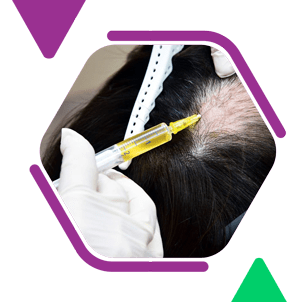- Home
- About Us
- Hair Treatment
- Hair Transplant
- Hair Loss
- Causes of Hair Loss
- Clinical Features
- Laboratory Test
- Medical Treatment
- Cyclic Treatment
- PRP
- Laser Treatment
- Surgical Treatment
- FUE
- Robotic
- FUT
- Beard Reconstruction
- Moustache Reconstruction
- Eyebrow Reconstruction
- Side Burn Reconstruction
- Complications Of Hair Transplant
- Alopecia Areata
- Telogen Effluvium
- Cosmetic Surgery
- Plastic Surgery
- Gallery
- Blogs
- Contact Us
Telogen Effluvium

Telogen Effluvium:
This is the most common diagnosis in women in everyday hair clinics.
Telogen Effluvium is characterized by the sudden shedding of hair on the entire scalp as a result of an early, synchronous entry of hair follicles (more than 20%) into the telogen phase.
TE is more common in women than in men.
Causes:
- Thyroid influences: hypo- or hyperthyroidism.
- Iron deficiency (found in about 72% of female patients).
- Fever.
- Postpartum period.
- Major surgery and prolonged anesthesia.
- Malignant diseases and malabsorption.
- Crash dieting/hypoproteinemia (rapid weight loss with less than 1000 calories/day intake can often cause immediate arrest of anagen followed by TE).
- Vitamin D deficiency.
- Vitamin A overdose (more than 50,000 IU daily).
- Zinc deficiency.
- Copper deficiency.
- Selenium deficiency.
- Deficiency in essential fatty acids (Vitamin F).
- Psychological stress, acute anxiety, and depression.
- Medications like chemotherapy and radiotherapy.
Clinical Features:
- Predominantly occurs in females.
- Abrupt onset of hair shedding.
- Reduction in hair density and ponytail diameter.
- Hair thinning, especially on the temples.
Management involves:
- Addressing the underlying cause.
- Iron supplementation.
- Correcting thyroid functions.
- Psychotherapy and assurance.
- Medication such as topical minoxidil.
It is a condition characterized by the sudden and excessive shedding of hair from the scalp. It is a prevalent diagnosis encountered in everyday hair clinics, particularly among women. This condition poses significant distress to individuals experiencing it, as it often leads to noticeable thinning of the hair and alterations in hair density. Understanding the intricacies of Telogen Effluvium, including its causes, clinical features, and management strategies, is crucial for both healthcare professionals and those affected by the condition.
Understanding :
It occurs when a large number of hair follicles prematurely enter the telogen or resting phase of the hair growth cycle simultaneously. This phenomenon disrupts the natural hair growth process, leading to the shedding of hair from the scalp. While hair shedding is a normal part of the hair growth cycle, Telogen Effluvium involves an abnormal increase in the number of hairs shed during the telogen phase.
Prevalence and Gender Distribution
It is more commonly observed in women compared to men. The reasons behind this gender disparity are multifactorial and may include hormonal influences, physiological differences, and varying susceptibilities to certain triggers. However, it’s essential to recognize that Telogen Effluvium can affect individuals of any gender and age group.
Causes :
It can be triggered by a wide range of factors, including:
– Thyroid Influences: Thyroid disorders, such as hypothyroidism or hyperthyroidism, can disrupt normal hair growth cycles and contribute to Telogen Effluvium.
– Nutritional Deficiencies: Iron deficiency, often found in a significant proportion of female patients, is a common cause of Telogen Effluvium. Other nutrient deficiencies, including those of vitamin D, vitamin A, zinc, copper, selenium, and essential fatty acids, can also play a role.
– Physiological Stressors: Events such as fever, the postpartum period following childbirth, major surgery accompanied by prolonged anesthesia, and crash dieting leading to rapid weight loss can trigger Telogen Effluvium.
– Medical Treatments: Certain medications and medical treatments, including chemotherapy and radiotherapy, may induce Telogen Effluvium as a side effect.
– Psychological Stress: Acute anxiety, depression, and other forms of psychological stress can impact hormonal balance and contribute to hair shedding.
Clinical Features
Recognizing the clinical features of Telogen Effluvium is essential for accurate diagnosis and management. Key clinical features include:
– Predominantly Occurs in Females: While Telogen Effluvium can affect individuals of any gender, it is more commonly observed in women.
– Abrupt Onset of Hair Shedding: Patients often report a sudden increase in hair shedding, which may be alarming and distressing.
– Reduction in Hair Density: The shedding of hair leads to a noticeable decrease in hair density, particularly on the scalp.
– Changes in Ponytail Diameter: Individuals may observe a reduction in the diameter of their ponytail due to decreased hair volume.
– Hair Thinning, Especially on the Temples: Thinning of the hair, especially around the temples and crown area, is a characteristic feature of Telogen Effluvium.
Management of Telogen Effluvium
The management of Telogen Effluvium focuses on addressing underlying causes, promoting hair regrowth, and providing psychological support to affected individuals. Key management strategies include:
– Identifying and Addressing Underlying Causes: Healthcare professionals should conduct a thorough evaluation to identify and address any underlying factors contributing to Telogen Effluvium, such as nutritional deficiencies, thyroid disorders, or psychological stressors.
– Nutritional Supplementation: Supplementation with iron, vitamin D, zinc, copper, selenium, and essential fatty acids may be recommended to correct any identified deficiencies and support healthy hair growth.
– Thyroid Function Correction: For individuals with thyroid disorders, optimizing thyroid function through medication and lifestyle interventions is essential in managing Telogen Effluvium.
– Psychotherapy and Psychological Support: Addressing psychological stressors through psychotherapy, counseling, or support groups can help individuals cope with the emotional impact of hair loss.
– Topical Medications: Topical treatments such as minoxidil may be prescribed to promote hair regrowth and improve hair density.
Conclusion
It is a common condition characterized by excessive hair shedding, predominantly observed in women. While the sudden onset of hair loss can be distressing, understanding the causes, clinical features, and management strategies of Telogen Effluvium is essential for effective diagnosis and treatment. By addressing underlying factors, promoting healthy hair growth, and providing psychological support, healthcare professionals can help individuals affected by Telogen Effluvium regain confidence and manage their condition effectively.
Our Services
- Hair Loss
- Causes of Hair Loss
- Clinical Features
- Laboratory Test
- Medical Treatment
- Cyclic Treatment
- PRP
- Hair Transplant
- Surgical Treatment
- FUE
- FUT
- Beard Reconstruction
- Moustache Reconstruction
- Eyebrow Reconstruction
- Side Burn Reconstruction
- Complications of Hair Transplant
- Alopecia Areata
- Telogen Effluvium
- Laser Treatment



 Book an Appointment
Book an Appointment